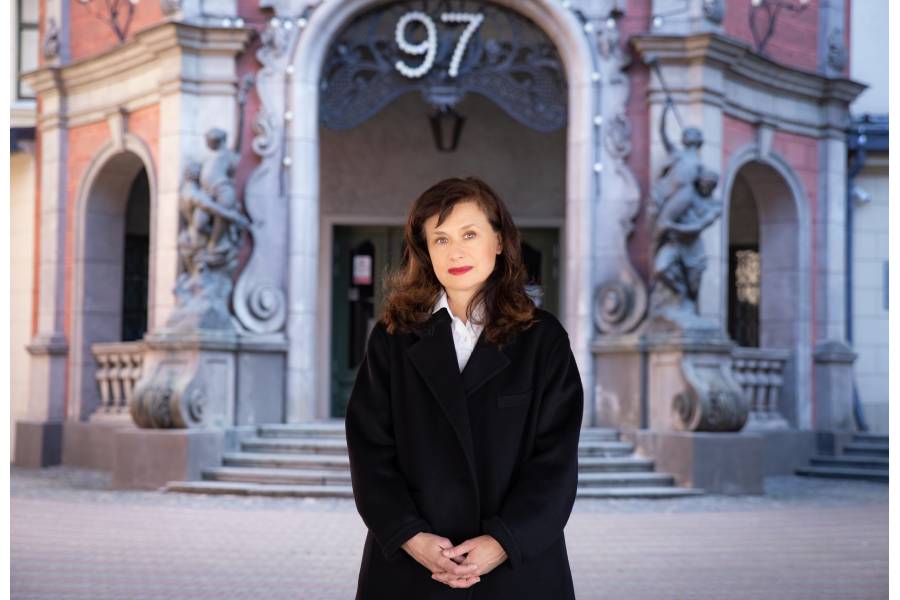
FNE: How would you describe the situation of the domestic cinema these days?
Dita Rietuma: The recent period of 2018-2020 was very successful for the Latvian cinema. National films dominated the Latvian box office during these years. For example, in 2018, five of the most popular films in Latvia were domestic productions. Latvian films were among the most watched films in 2019, as well as in 2020, when the pandemic began.
Unfortunately, the effect of the pandemic on the cinema attendance has been felt, Latvia’s cinemas have been closed for a long time, therefore the process of screening and distributing films has been disrupted. Of course, we are not in a unique situation, all European countries are feeling the effects of the pandemic on film exhibition and distribution. However, the issue of film distribution in cinemas and online platforms, the question of possible changes in the business model of the film industry, is very relevant. There are still more questions than answers. One thing is clear – we are living in a time of substantial changes.
FNE: How do you see the Latvian cinema in five years?
Dita Rietuma: In recent years, Latvian cinema has been characterised by its determination for development and growth. It should be noted that funding for Latvian film production has increased several times in recent years. For example, in 2012 it was only 1.5 m EUR, in 2017 already 9.7 m EUR, in 2020 it was 8.4 m EUR.
The gradual increase in funding has allowed to diversify the production output, to explore new genres and stylistic approaches, as well as to gradually introduce a new generation of directors. These are all positive trends that should continue over the next five years. A gradual increase in funding will allow for a broad spectrum of productions in terms of styles, genres and strong artistic voices.
I hope that Latvian cinema will succeed and will continue to strengthen its international circulation. The role of festivals in raising the profile of European cinema has not yet been "abolished"; it has and is likely to have a role and influence in strengthening the hierarchy of the values of European cinema.
FNE: What are your challenges and long-term goals?
Dita Rietuma: Some of the challenges relate to changes in the audiovisual landscape, to which European cinema will also have to adapt. There will certainly be competition between cinemas and streaming platforms, and it will inevitably have to take into account changes in viewers’ habits and the desire to consume audiovisual productions online.
The topic of media literacy or film literacy is still relevant. European cinema, which is complicated and complex in form, is not always able to appeal to viewers. Therefore, the competencies of viewers, especially young viewers, need to be developed, including their ability to appreciate European cinema and its film language. There are and will be many challenges, both for the European audiovisual sector as a whole and for filmmakers in each country, especially small countries.
FNE: How important is it for you to coproduce with neighbouring countries?
Dita Rietuma: Cooperation and coproductions with neighbouring (and not only neighbouring) countries is very important for Latvian cinema. Its rationale is not only economic - the need to attract funding for filming in neighbouring countries - but it also offers the possibility of expanding the market for film and its cross-border circulation.
Traditionally, Latvian filmmakers cooperate most intensively with the neighbours of the Baltic States Lithuania and Estonia. Intensive and high-quality cooperation has also been established with Czech production companies. The Czech Republic is the third most popular coproduction partner for Latvian filmmakers. In the last five or six years, 15 coproductions with the Czech Republic have been made: minority and majority coproductions.
I will mention just a few examples: in 2021, a film for the youth audience Lame-os aka Tizlenes by Marta Elina Martinsone was released as a coproduction of Latvian and Czech studios, Ego Media and 8Heads Productions. The film is also dubbed in Czech, which is a unique case in Latvian coproduction practice. It has been successfully shown in cinemas in Latvia in 2021, as well as at several festivals in the Czech Republic and Germany.
Cooperation with Hungarian filmmakers has also proved successful. The film Natural Light by Dénes Nagy, which was a minority coproduction of Latvia with Hungary, and which was also coproduced with Belgium, France and Germany, won the award for the best director at the Berlin Film Festival in 2021.
Returning to co-operation with our closest neighbours, for the second time in the last five years, our neighbour Lithuania nominates a documentary made in co-operation between Latvia and Lithuania as a candidate for an Academy Award of the American Film Academy. In 2019, it was a documentary film The Bridges of Time / Laika tilti produced by VFS Films (Latvia) in coproduction with Vesilind (Estonia) and Studio Nominum (Lithuania).
Recently, the documentary Jump directed by Giedrė Žickytė, which is a Lithuanian/Latvian/French coproduction produced by Moonmakers in coproduction with Latvia’s VFS Films and Faites un Voeu (France), has been nominated from Lithuania for the 94th Academy of Motion Picture Arts and Sciences award in the Best International Feature Film category.
A cash-rebate system has been operating in Latvia since 2010, which has also become an incentive for successful cooperation between filmmakers from neighbouring countries.



















